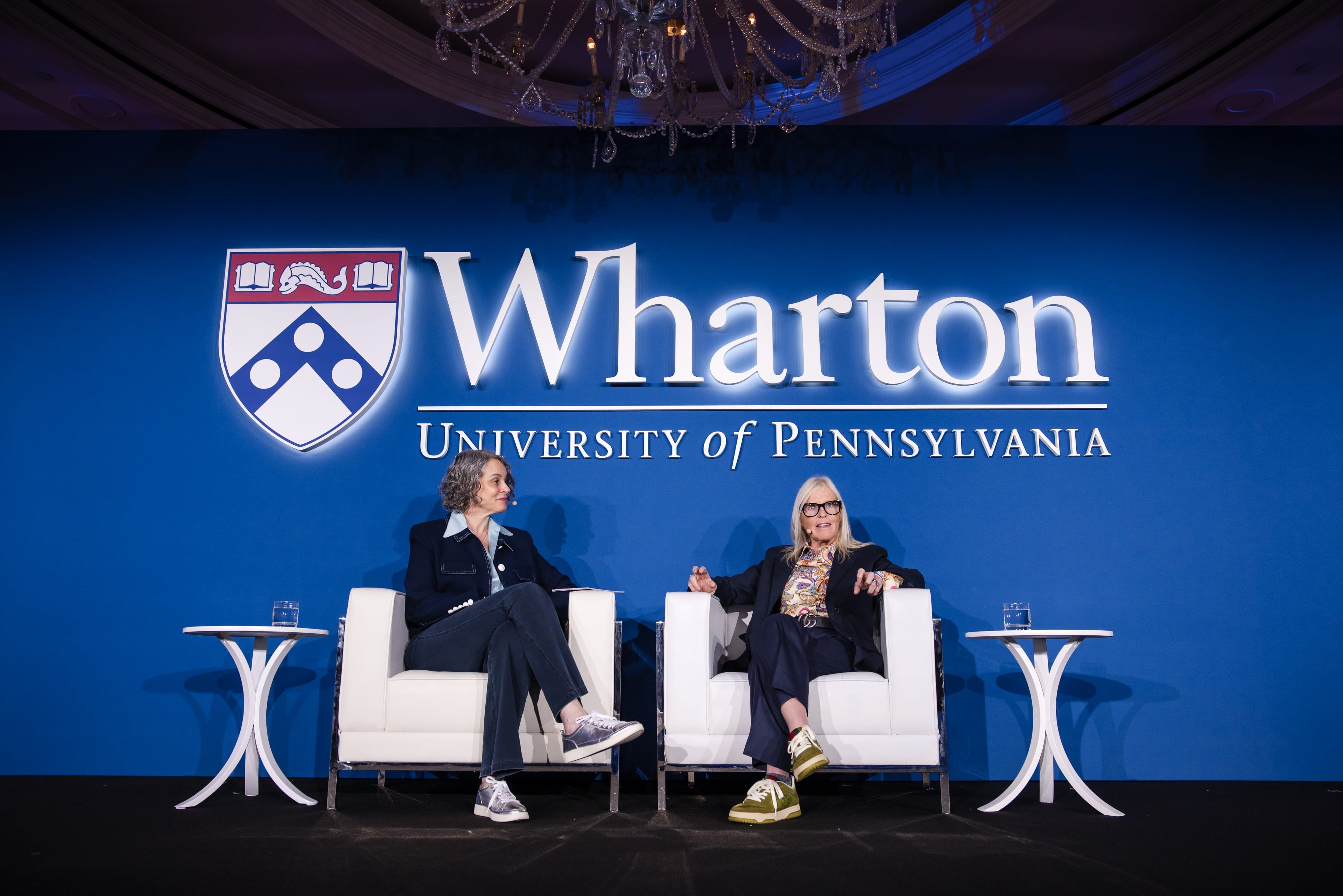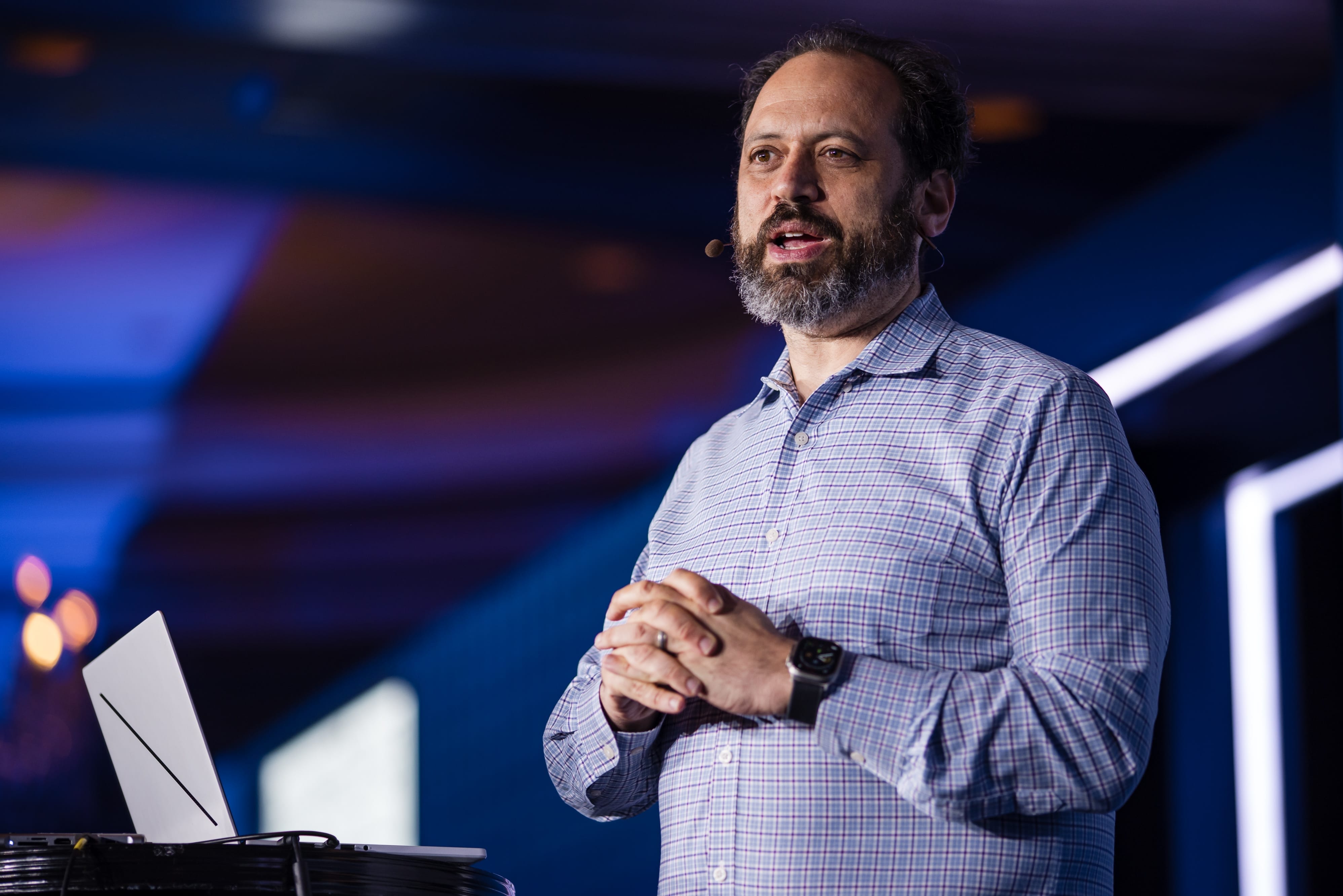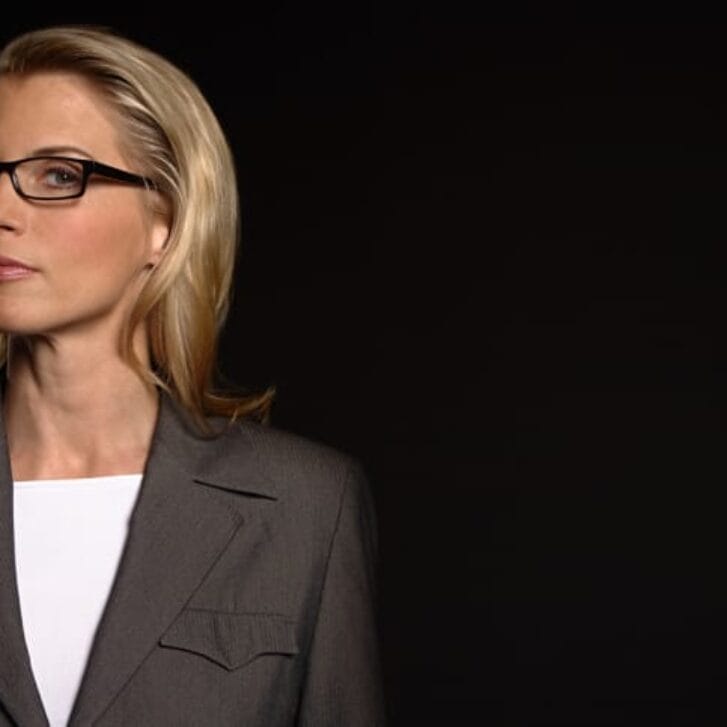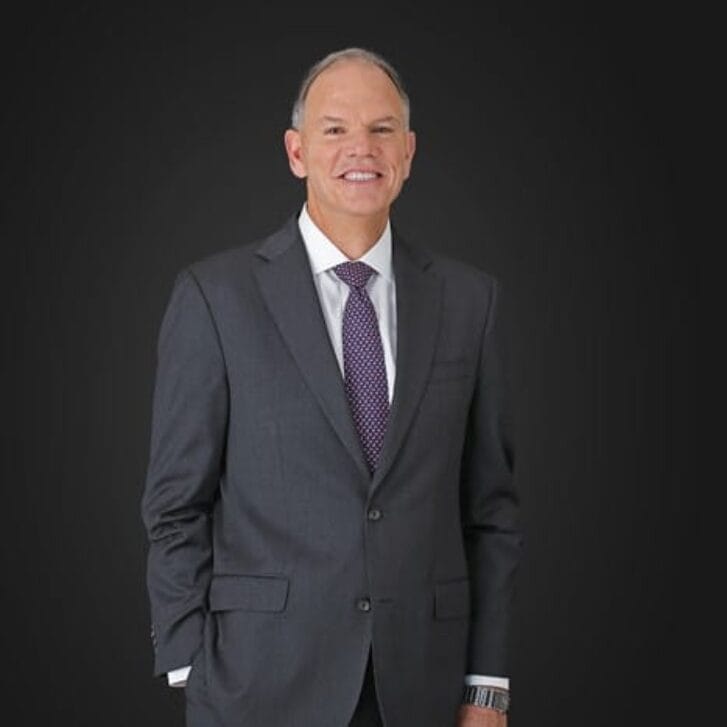Wharton thought leaders and Bay Area experts shared their knowledge and ideas on the Wharton Global Forum stage in San Francisco on June 26 and 27. More than 600 alumni and friends registered to listen and engage with nearly 10 hours of programming about topics including artificial intelligence applications, entrepreneurial journeys, health-care innovations, the identity of San Francisco itself, and more.
For those who missed out on learning alongside peers, here are some key takeaways from the 57th Global Forum.
Bold Thinking in the Bay
Wharton Spotlights San Francisco’s New Leadership and Unique Culture
Dean Erika James sat down with Lead Bank CEO and Global Forum chair Jackie Reses W92 and San Francisco mayor Daniel Lurie for candid conversations on leadership, disruption, and the future of cities. Two cornerstone conversations spotlighted San Francisco’s dual identity as a hub of innovation and a case study in civic transformation.
In a defining exchange with Dean James, Reses celebrated San Francisco’s unique “pivot culture,” a mindset that reframes failure as learning and encourages bold reinvention.
“This is the best place for pivot culture,” Reses said. “Everybody can fail, and it’s a point of pride.”
Reses, a fintech entrepreneur and longtime resident, described how the city’s layered talent ecosystem fosters innovation across AI and finance and beyond. She said we all should be redefining work in every function of their jobs, emphasizing first-principles thinking and the power of questioning long-held assumptions.
The conversation also touched on Reses’s Wharton roots, her journey through finance and tech, and the discipline required to build and challenge new systems from the ground up.
Later, Dean James welcomed Mayor Lurie for a timely discussion about civic resilience. They explored the pandemic’s long-term impacts and the rebuilding of trust and community and exchanged reflections on how to lead through turbulence by expanding influence, rather than narrowing it.
“The tendency when you are feeling threatened or under pressure is to narrow your circle of influence,” Dean James said. “We need to fight that tendency and do exactly the opposite.”
These sessions captured the spirit of the host city: ambitious, complex, and still writing its next chapter. And through it all, Wharton’s network of leaders continues to shape — and be shaped by — the cities and economies they help build.
Inventing What’s Next
Wharton Leaders Explore Innovation in a Changing World
At the 2025 forum, innovation wasn’t a buzzword — it was a call to action.
Innovation isn’t an add-on; it’s an imperative. Three dynamic sessions showcased how Wharton alumni and faculty are leading transformation across sectors, from biotech to consumer brands to venture capital.
On Thursday night, forum attendees listened in on a bold conversation between Dean James and Vinod Khosla, founder of Khosla Ventures. The session, titled “Leadership at the Edge of Disruption,” explored the mindset that leaders need to operate in uncertainty and the value of vision when reinvention is constant. Khosla and Dean James reflected on taking risks and leading with clarity in sectors where the only constant is change.
That theme carried into Friday’s programming. Marissa King, Alice Y. Hung President’s Distinguished Professor at Wharton, led a talk on the future of health care at which alumni and faculty examined how cutting-edge treatments like CAR-T-cell therapy are reshaping lives — and business models. As science surges forward, panelists called for new frameworks to bring breakthrough therapies to scale.
Innovation also took center stage in a conversation between vice dean Lori Rosenkopf and entrepreneur Amy Errett WG88, founder of Madison Reed. Recently, Rosenkopf published a book, “Unstoppable Entrepreneurs, 7 Paths for Unleashing Successful Startups and Creating Value through Innovation,” that shines a spotlight on the paths of successful entrepreneurs, including Errett.

Vice Dean of Entrepreneurship Lori Rosenkopf (left) included Amy Errett WG88’s professional journey in her new book on “unstoppable entrepreneurs.”
During the discussion, Errett traced her journey from VC to CEO, sharing how curiosity and culture fueled her company’s growth — even during moments of massive disruption.
Though these sessions each focused on different industries, their messages converged: Innovation isn’t just about technology. It’s about courage, timing, and building what doesn’t yet exist. That spirit echoed throughout other forum sessions and continues to define the Wharton community worldwide.
Wharton Experts Unpack the AI Revolution
Forum speakers shared research and strategies shaping AI’s next chapter
Generative AI is no longer theoretical; it’s operational. At the forum, Wharton alumni, faculty, and friends explored how AI is reshaping business execution, leadership models, and more.
The opening keynote was delivered by Ethan Mollick, co-director of Wharton Generative AI Labs and the Ralph J. Roberts Distinguished Faculty Scholar, who encouraged the audience to move from learning about AI to learning with AI.
“We are no longer teaching about technology,” Mollick said. “We’re teaching through it.”
In a captivating and jam-packed presentation, Mollick demonstrated real-time AI prototyping and cited data showing that AI tools can increase knowledge-work productivity by 40 percent or more. Mollick stressed that the pace of AI innovation isn’t slowing to wait for policy or consensus. He encouraged business leaders to learn about AI tools through use, so they can be better positioned for the future.

Ethan Mollick, co-director of the Wharton Generative AI Labs, urged forum attendees to experiment with new tools.
“You can be ahead of everyone else if you just start using the tools,” he said.
Later, a panel led by Kartik Hosanagar, co-director of Wharton Human-AI Research and the John C. Hower Professor, unpacked the evolving AI value chain — from foundational models to consumer-facing applications. Industry panelists from Microsoft, T. Rowe Price, GrowthCurve Capital, HongShan Capital Group, and Newfront discussed how leaders are adapting to an AI-accelerated economy, emphasizing the need to build not just tools, but trust.
Together, these two sessions captured just a slice of the forum’s broader dialogue around AI. Throughout the event, expert speakers brought dynamic perspectives to AI’s growing role in business and society.
This programming was part of Wharton’s broader commitment to understanding and shaping the AI-driven economy. Learn more through the Wharton AI and Analytics Initiative (WAIAI).
Watch Forum Session Recordings
For those who missed out on the 57th Wharton Global Forum in San Francisco or just want to revisit favorite sessions, the School’s got it covered with this playlist of session recordings from the past 13 years of Global Forums.

























